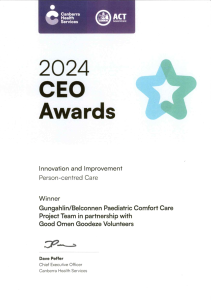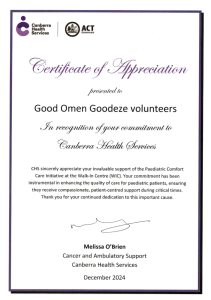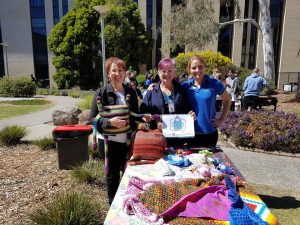Winner, 2024 CEO Awards Canberra Health Services
Awarded to Gunghalin/Belconnen Paediatric Comfort Care Project Team in partnership with Good Omen Goodeze. Presented by Dave Peffer, CEO Canberra Health Services.
Innovation and Improvement: Person-centred Care
Certificate of Appreciation, Canberra Health Services
Awarded to Good Omen Goodeze. Presented by Melissa O’Brien, Cancer and Ambulatory Support, December 2024.
CHS sincerely appreciate your invaluable support of the Paediatric ComfortCare Initiative at the Walk-In Centre (WIC). Your commitment has been instrumental in enhancing the quality of care for paediatric patients, ensuring they receive compassionate, patient-centred support during critical times. Thank you for your continued dedication to this important cause.
Nomination Volunteer Team of the Year, VolunteeringACT
Awarded to Good Omen Goodeze, at the Volunteering Awards ceremony, December 2024.
Volunteer Manager of the Year Finalist, VolunteeringACT
Awarded to Mary Liondi-Barlow, at the Volunteer Manager of the Year Awards ceremony, November 2024.
Local Hero Finalist, Westfield Belconnen
Awarded to Mary Liondi-Barlow, at the Westfield Belconnen Local Hero Award Ceremony, October 2024.
Highly Commended Young Volunteer of the Year, VolunteeringACT
Awarded to Zoe Barlow at the Volunteering Awards ceremony, December 2023. Presented by Robyn Hendry, Chair of VolunteeringACT, and Jean Glese, CEO VolunteeringACT.
Exceptional volunteering in the Canberra region
Nomination Volunteer Team of the Year, VolunteeringACT
Awarded to Good Omen Goodeze, at the Volunteering Awards ceremony, December 2023.
Nomination Volunteer Team of the Year Award, VolunteeringACT
Awarded to Good Omen Goodeze at the 2022 Volunteering Awards ceremony.
Recognition Award, VolunteeringACT
Awarded to Good Omen Goodeze at the Volunteering Awards ceremony, December 2021. Presented by Robyn Hendry, Chair of VolunteeringACT, and Jean Glese, CEO VolunteeringACT:
In recognition of outstanding volunteering service in the Canberra region.
Certificate of Appreciation, Australian College of Nursing
Awarded to Good Omen Goodeze on International Volunteer Day December 2020:
In recognition and gratitude of your valuable support and contribution to the ACN’s strategic intent of Advancing Nurse Leadership, and your commitments to supporting all nurses.
Certificate of Appreciation, Canberra ICU
Awarded to Mary Barlow and the Good Omen Goodeze.
Certificate of Appreciation, University of Canberra
Awarded to Mary Liondi-Barlow on September 2018. Presented by Professor Karen Strickland, Head of School, Nursing, Midwifery and Public Health, Faculty of Health:
For sharing the work of Good Omen Goodeze at the welcome lunch and for exceptional support for students and staff on exchange from the Prefectural University of Hiroshima.
Letter of Appreciation, Division of Critical Care in the Intensive Care Unit at the Canberra Hospital
Awarded to Mary Liondi-Barlow on May 2018. Presented by Carly Silberberg, Assistant Director of Nursing, and Dr. Bronwyn Avard, Clinical Director of ICU:
To all of your and the GOGs hard work and dedication to the Intensive Care Unit and The Canberra Hospital.
Testimonial ICU Canberra Hospital:
“I would like to feedback to the many crafters about the positive impact that their comfort items have on the patient and family experience in Canberra’s Hospital Intensive Care Unit. After consultation with my fellow colleagues in ICU, it is very difficult to highlight just one example of how the comfort goods have made a positive experience on a patient or family, because frankly we can attest to many.
Unanimously the ICU team are so appreciative for the comfort items as they support us to deliver personal and exemplary care to the distressed, the lonely and bereaved. The donated blankets are gifted to every end of life situation in ICU and the families are encouraged to choose which blanket they want to place on the bed of their loved one. The significance of this cannot be underestimated on how much comfort this gives a family when they leave the hospital. The blanket transforms into more than just a blanket as it will provide a source of personal comfort and solace in their bereavement often forever.
A social work testimonial that was shared to us was from a mother of a child who said she keeps her blanket in a special box and when she needs comfort she goes to the box and gets it out and holds it, as she remembers the last time she held her son who was covered with this blanket. Some of our nursing staff recall seeing this same mother walking out of the hospital draped in this blanket. This image had a profound effect on our staff and taught us that the blankets are not merely blankets but important for psychological comfort and support in bereaved states.
There are many nursing testimonials that demonstrate the blankets are therapeutic to emotional healing and recovery. One example was of a socially isolated patient with complex mental health issues that resulted in them being in a homeless situation. This patient due to health issues required an ICU admission. When they received the gift of a beanie, scarf and blanket it transformed the care we gave them. Prior to this they were non communicative and guarded but with the gift they felt valued and special and began to trust us, which in turn opened them up to accept care that lead to their recovery. On reflection of this patient story our social worker said the gift of the comfort goods was an “ice breaker”. We later learnt this person was institutionalised as a child and as unbelievable as it sounds, the comfort goods from GOG were the first gifts they ever received. It broke our hearts when they asked for a knitted teddy bear. Apparently their first one.
We often hear patients say I can’t believe how generous complete strangers are. This simple act of kindness leads those affected to want to feed back to us or pass it on or pay it forward in ways we can never know or measure. Recently a small quilting group from a country town was touched by the care that was given to a young bereaved family from their community they tragically lost. Their mother was so touched that the children of this patient were gifted a blanket and teddy to love and cherish, that they in turn gifted 8 beautiful quilts to ICU. This really is a fine example of how the act of care and comfort generates and inspires others to do the same.
Often we hear families take a moment out of their grief to say how beautiful this blanket is or how thoughtful these volunteers are that take the time and care to make a beautiful blanket for someone they do not know. Thanks to the crafters the long term ICU patients can go out onto the balcony in winter to enjoy the simple pleasure of sunlight with a beanie, scarf and blanket. Those same long term patients can also go down to coffee shop and blend in with the population thanks to the gowns that are handmade. This is so important for self-esteem. The modified clothes and gowns in their vibrant colour make our patients feel like a unique person and decrease feelings of institutionalisation. There are many testimonials from our long term patients that say the personalised gowns were so significant for their emotional recovery after prolonged ICU admissions. Every child admitted to ICU receives a comfort doll or ‘Gogster’ which we often use as a comforter during procedures.
In conclusion on behalf of the ICU team I would like to feedback our profound gratitude and thanks for the support you give us to make the patient experience a positive one.
– Kathleen Cook, Registered Nurse ICU







